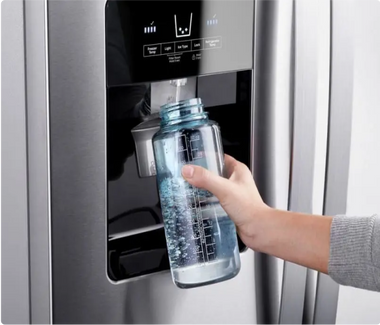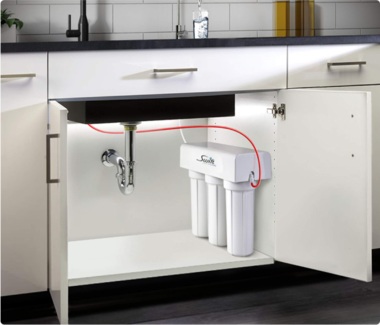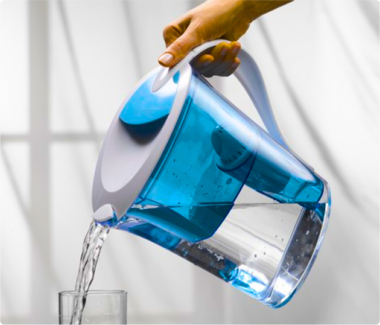Hard Water vs. Soft Water: Difference Between Hard and Soft Water
Posted by Swift Green Filters on

Hard Water vs. Soft Water: Difference Between Hard and Soft Water
Have you ever noticed that water tastes different depending on where you are in the world? Maybe you noticed that your hair feels different after a bath, or that your clothes feel different when washed? This is all due to the water quality you are using. Here is all you need to know about hard water vs. soft water.
Understanding Water
All water is not created equal. Most of the water present in the USA is hard water, but many people use water softeners to extract the minerals. The hardness or softness of water is decided by the mineral concentrations present in the water of both calcium and magnesium. Although ordinary water is shiny, it contains minerals and chemicals.
Water is simply a chemical substance. It is transparent and does not have any colour, odour or taste in its characteristics. Water is categorized in two heads: hard water and soft water. The two types are not separated by touch, feel, or appearance. Hard water and soft water are differentiated on the basis of the mineral content of each. Let’s understand this.
What is Hard Water?
Hard water contains high amounts of Calcium and Magnesium, these two minerals naturally occurring in water. Hard water is full of "stuff" – but it’s not dirt. Hard water carries minerals that are actually nutrients. Drinking hard water with a lot of essential minerals is good for your health.
What is Soft Water?
Soft water is free from harsh minerals. It is gentler to your body and home. Soft water increases the effectiveness of soap as compared to hard water. It contains sodium, this is the main difference between soft and hard water.
What are the Differences Between Soft Water and Hard Water?
To make you understand how hard water and soft water are different from each other, here are some big differences:
|
S.No. |
Hard Water |
Soft Water |
|
1. |
It has a high concentration of minerals. |
It has a low amount of minerals present in it. |
|
2. |
It leaves stains in washed dishes after they have dried |
It does not leave any spots on the dishes. |
|
3. |
It contains mainly calcium and magnesium |
It contains only sodium. |
|
4. |
Soap is not so effective. No foam and lather from soap is formed.
|
Soap is effective. The Bubbly lather from soap is formed. |
|
5. |
It is preferred as drinking water. |
It is not preferred as drinking water. |
|
6. |
It has a flavor feature. |
It has a salty taste. |
|
7. |
It is formed when water flows with limestone, chalk and other rocks. |
Rainwater is generally soft water. When it falls on the ground and gets mixed with minerals then it becomes hard water. |
|
8. |
Not suitable for boilers and other equipment. |
It can be used freely in boilers and other equipment. |
|
9. |
It is not beneficial for the skin and hair. Hair and skin will dry out. |
It is good for skin and hair. Hair and skin become soft. |
|
10. |
Groundwater like deep wells is the example of the hard water.
|
Rainwater is the example of soft water. |
Hard Water & Soft Water: Which is better?
Hard water and soft water both have their merits. Since hard water contains calcium and magnesium, it is better to drink and taste better than soft water. Soft water is salty to the taste as there is sodium in it.
Soft water is preferred to clean, as it rarely creates soap or mineral stains. It is an efficient and effective cleaning agent. Soft water is good for the skin and hair compared to hard water. Washing your hair regularly with hard water can leave your scalp feeling itchy.
The pH balance of your skin can also be altered due to its complex minerals, which weaken the skin as a barrier to harmful bacteria and diseases.
If you have problems with dry skin and itchy scalp, you may want to seek a water softening system in your home. If that does not happen, talk to your dermatologist about cosmetics and hair
What type of water do you have?
It is usually easier to observe hard water than soft water. Look for conversational signs such as soap stains on utensils after washing and a feeling of dryness on your hair and skin. Soft water will not leave any visible marks, but it can leave your skin feeling soft after bathing, and you may notice a slightly salty taste when you drink it, although this is often invisible.
Conclusion
Here we have explained each and everything about hard water vs. soft water. All the differences between hard water and soft water are explained perfectly. Most people can securely drink soft and hard water with no complications.
If you’re concerned about softening your water, you can shop for water softeners to soften your hard water.
Shop By Category
Swift Green Filters offers wide variety of filtration product

This product is a compatible Replacement Water Filter.
This filter is not sourced by or sponsored by the above mentioned brands. Swift does not represent any of the above brands.
All Mentioned Brands names and part numbers have been used for reference purposes only. Swift Green Filters is an independent brand.
Swift is not responsible for damage caused by installation or equipment errors. Max liability is two times of the cost of product

We Have
Awesome Discounts
Subscribe to our newsletter to get discounts.










